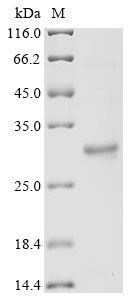Recombinant Mouse Growth/differentiation factor 15 (Gdf15)
CAT:
399-CSB-EP859530MO-02
Size:
100 µg
Price:
Ask
- Availability: 24/48H Stock Items & 2 to 6 Weeks non Stock Items.
- Dry Ice Shipment: No




Recombinant Mouse Growth/differentiation factor 15 (Gdf15)
- CAS Number: 9000-83-3
- Gene Name: Gdf15
- UniProt: Q9Z0J7
- Expression Region: 189-303aa
- Organism: Mus musculus
- Target Sequence: SAHAHPRDSCPLGPGRCCHLETVQATLEDLGWSDWVLSPRQLQLSMCVGECPHLYRSANTHAQIKARLHGLQPDKVPAPCCVPSSYTPVVLMHRTDSGVSLQTYDDLVARGCHCA
- Tag: N-terminal 6xHis-SUMO-tagged
- Source: E.coli
- Field of Research: Cardiovascular
- Assay Type: Developed Protein
- Relevance: Regulates food intake, energy expenditure and body weight in response to metabolic and toxin-induced stresses. Binds to its receptor, GFRAL, and activates GFRAL-expressing neurons localized in the area postrema and nucleus tractus solitarius of the brainstem. It then triggers the activation of neurons localized within the parabrachial nucleus and central amygdala, which constitutes part of the 'emergency circuit' that shapes feeding responses to stressful conditions. On hepatocytes, inhibits growth hormone signaling.
- Purity: Greater than 85% as determined by SDS-PAGE.
- Activity: Not Test
- Length: Full Length of Mature Protein
- Form: Liquid or Lyophilized powder
- Buffer: If the delivery form is liquid, the default storage buffer is Tris/PBS-based buffer, 5%-50% glycerol. If the delivery form is lyophilized powder, the buffer before lyophilization is Tris/PBS-based buffer, 6% Trehalose, pH 8.0.
- Reconstitution: We recommend that this vial be briefly centrifuged prior to opening to bring the contents to the bottom. Please reconstitute protein in deionized sterile water to a concentration of 0.1-1.0 mg/mL.We recommend to add 5-50% of glycerol (final concentration) and aliquot for long-term storage at -20℃/-80℃. Our default final concentration of glycerol is 50%. Customers could use it as reference.
- Molecular Weight: 25.5 kDa
- References & Citations: "Long-acting MIC-1/GDF15 molecules to treat obesity: Evidence from mice to monkeys." XIong Y., Walker K., Min X., Hale C., Tran T., Komorowski R., Yang J., Davda J., Nuanmanee N., Kemp D., Wang X., Liu H., Miller S., Lee K.J., Wang Z., Veniant M.M. Sci. Transl. Med. 9:0-0 (2017)
- Storage Conditions: The shelf life is related to many factors, storage state, buffer ingredients, storage temperature and the stability of the protein itself. Generally, the shelf life of liquid form is 6 months at -20℃/-80℃. The shelf life of lyophilized form is 12 months at -20℃/-80℃.
